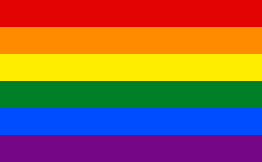Same-sex marriage in Bonaire, Sint Eustatius and Saba
Same-sex marriage in Bonaire, Sint Eustatius and Saba is legal, following the entry into force of a law enabling same-sex couples to marry on 10 October 2012.[1][2] The change to the Civil Code of the Caribbean Netherlands (Dutch: Burgerlijk Wetboek BES; Papiamento: Kódigo Sivil BES) was proposed by the Dutch House of Representatives rather than the Rutte Government which preferred to negotiate the change with the islands first.[3][4] The issue was very controversial on the island of Sint Eustatius, with many Christian islanders opposing the principle of the law and because of the perceived "neocolonialism" of the Netherlands imposing such a law on its overseas municipalities.[5]
|
Civil unions and registered partnerships
|
||
|
See also
|
||
|
Notes
* Not yet in effect or automatic deadline set by judicial body for same-sex marriage to become legal |
||
|
LGBT portal | ||
.svg.png)
Article 1:30 of the Civil Code was amended to read:[6]
- Een huwelijk kan worden aangegaan door twee personen van verschillend of van gelijk geslacht
- (A marriage can be entered into by two persons of opposing or the same sex)
The first same-sex marriage was performed on Saba on 4 December 2012 between two men, one Aruban and one Venezuelan, who were both residents of Aruba.[7][8][9] The first same-sex wedding in Bonaire was celebrated in May 2013.[10]
Same-sex marriages and registered partnerships performed elsewhere have been legally recognised on the islands since 1 January 2011.[11]
See also
References
- "Burgerlijk wetboek BES, boek 1" (in Dutch). Government of the Netherlands. Archived from the original on 4 April 2016. Retrieved 12 October 2012.
- "Aanpassingswet openbare lichamen Bonaire, Sint Eustatius en Saba" (in Dutch). Government of the Netherlands. 1 September 2010. Archived from the original on 6 March 2016. Retrieved 4 April 2016.
- "Aanpassingswet openbare lichamen Bonaire, Sint Eustatius en Saba, Nr. 23 GEWIJZIGD AMENDEMENT VAN DE LEDEN VAN GENT EN REMKES TER VERVANGING VAN DAT GEDRUKT ONDER NR. 14" (in Dutch). Government of the Netherlands. 5 March 2010. Archived from the original on 2 April 2016. Retrieved 4 April 2016.
- "Aanpassingswet openbare lichamen Bonaire, Sint Eustatius en Saba, NOTA NAAR AANLEIDING VAN HET VERSLAG" (in Dutch). Government of the Netherlands. 5 November 2009. Archived from the original on 3 March 2016. Retrieved 18 December 2010.
- "Resistance against same-sex marriages on St Eustatius". Rnw.org. Retrieved 2017-04-01.
- "Burgerlijk Wetboek BES Boek 1". wetten.overheid.nl (in Dutch). Retrieved 6 May 2020.
- "Saba records first gay marriage on Tuesday". St. Maarten Time. 4 December 2012. Archived from the original on 13 March 2016. Retrieved 4 April 2016.
- "First Gay Marriage In Dutch Caribbean". Curacao Chronicle. 4 December 2012. Archived from the original on 1 April 2016. Retrieved 4 April 2016.
- "First same-gender wedding in Caribbean Netherlands". Dutch Caribbean Legal Portal. 5 December 2012. Archived from the original on 4 April 2016. Retrieved 4 April 2016.
- (in Dutch) Eerste homohuwelijk op Bonaire
- "Tweede aanpassingswet openbare lichamen Bonaire, Sint Eustatius en Saba – A" (in Dutch). Government of the Netherlands. Archived from the original on 15 March 2016. Retrieved 18 December 2010.
.svg.png)
